Your search “Keep%20the%20Death%20Penalty%20Abolished%20fin%20the%20Philippfines%20%20%20%20%20%20%20%20%20%20/page/www.centaurtheatre.com ”
Document(s)
Keep the Death Penalty Abolished in the Philippines (Bicolano)
By World Coalition Against Death Penalty, on 23 March 2021
2021
Campaigning
Drug Offenses
Philippines
More details Download [ pdf - 2584 Ko ]
This brochure was developed by the World Coalition Against the Death Penalty with the Commission on the Human Rights in the Philippines. It explains why the death penalty risks returning in the Philippines and the reasons against its resurgence. It is available in 11 languages of the Philippines, plus French and English.
- Document type Campaigning
- Countries list Philippines
- Themes list Drug Offenses
Document(s)
Keep the Death Penalty Abolished in the Philippines (English)
By World Coalition Against Death Penalty, on 23 March 2021
Campaigning
Drug Offenses
Philippines
frMore details Download [ pdf - 7827 Ko ]
This brochure was developed by the World Coalition Against the Death Penalty with the Commission on the Human Rights in the Philippines. It explains why the death penalty risks returning in the Philippines and the reasons against its resurgence. It is available in 11 languages of the Philippines, plus French and English.
- Document type Campaigning
- Countries list Philippines
- Themes list Drug Offenses
- Available languages Maintenir l'abolition de la peine de mort aux Philippines (Français)
Document(s)
Keep the Death Penalty Abolished in the Philippines (Marano)
By World Coalition Against Death Penalty, on 23 March 2021
Campaigning
Drug Offenses
Philippines
More details Download [ pdf - 1410 Ko ]
This brochure was developed by the World Coalition Against the Death Penalty with the Commission on the Human Rights in the Philippines. It explains why the death penalty risks returning in the Philippines and the reasons against its resurgence. It is available in 11 languages of the Philippines, plus French and English.
- Document type Campaigning
- Countries list Philippines
- Themes list Drug Offenses
Document(s)
Keep the Death Penalty Abolished in the Philippines (Pangasinense)
By World Coalition Against Death Penalty, on 23 March 2021
Campaigning
Drug Offenses
Philippines
More details Download [ pdf - 1042 Ko ]
This brochure was developed by the World Coalition Against the Death Penalty with the Commission on the Human Rights in the Philippines. It explains why the death penalty risks returning in the Philippines and the reasons against its resurgence. It is available in 11 languages of the Philippines, plus French and English.
- Document type Campaigning
- Countries list Philippines
- Themes list Drug Offenses
Document(s)
Keep the Death Penalty Abolished in the Philippines (Tagalog)
By World Coalition Against Death Penalty, on 23 March 2021
Campaigning
Drug Offenses
Philippines
More details Download [ pdf - 2519 Ko ]
This brochure was developed by the World Coalition Against the Death Penalty with the Commission on the Human Rights in the Philippines. It explains why the death penalty risks returning in the Philippines and the reasons against its resurgence. It is available in 11 languages of the Philippines, plus French and English.
- Document type Campaigning
- Countries list Philippines
- Themes list Drug Offenses
Document(s)
Keep the Death Penalty Abolished in the Philippines (Tausug)
By World Coalition Against Death Penalty, on 23 March 2021
Campaigning
Drug Offenses
Philippines
More details Download [ pdf - 2595 Ko ]
This brochure was developed by the World Coalition Against the Death Penalty with the Commission on the Human Rights in the Philippines. It explains why the death penalty risks returning in the Philippines and the reasons against its resurgence. It is available in 11 languages of the Philippines, plus French and English.
- Document type Campaigning
- Countries list Philippines
- Themes list Drug Offenses
Document(s)
Keep the Death Penalty Abolished in the Philippines (Kapampangan)
By World Coalition Against Death Penalty, on 23 March 2021
Campaigning
Drug Offenses
Philippines
More details Download [ pdf - 731 Ko ]
This brochure was developed by the World Coalition Against the Death Penalty with the Commission on the Human Rights in the Philippines. It explains why the death penalty risks returning in the Philippines and the reasons against its resurgence. It is available in 11 languages of the Philippines, plus French and English.
- Document type Campaigning
- Countries list Philippines
- Themes list Drug Offenses
Document(s)
Keep the Death Penalty Abolished in the Philippines (Cebuano)
By World Coalition Against Death Penalty, on 23 March 2021
Campaigning
Drug Offenses
Philippines
More details Download [ pdf - 2567 Ko ]
This brochure was developed by the World Coalition Against the Death Penalty with the Commission on the Human Rights in the Philippines. It explains why the death penalty risks returning in the Philippines and the reasons against its resurgence. It is available in 11 languages of the Philippines, plus French and English.
- Document type Campaigning
- Countries list Philippines
- Themes list Drug Offenses
Document(s)
Keep the Death Penalty Abolished in the Philippines (Waray)
By World Coalition Against Death Penalty, on 23 March 2021
Campaigning
Drug Offenses
Philippines
More details Download [ pdf - 1057 Ko ]
This brochure was developed by the World Coalition Against the Death Penalty with the Commission on the Human Rights in the Philippines. It explains why the death penalty risks returning in the Philippines and the reasons against its resurgence. It is available in 11 languages of the Philippines, plus French and English.
- Document type Campaigning
- Countries list Philippines
- Themes list Drug Offenses
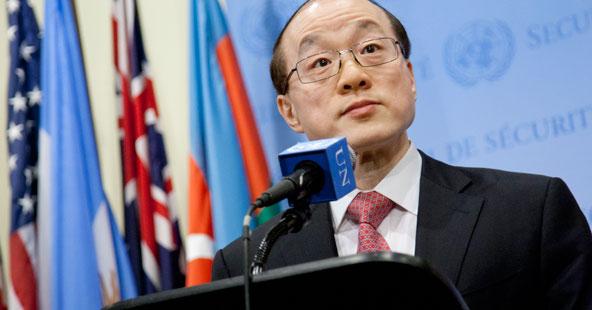
Article(s)
How far is China ready to reduce its use of the death penalty?
By Aurélie Plaçais, on 25 November 2013
The number one executioner in the world recently made national and international commitments to continuing to reform its death penalty, but how far is China really ready to go?
2013
China
Clemency
Drug Offenses
Terrorism
Document(s)
Keep the Death Penalty Abolished in the Philippines (Hiligaynon)
By World Coalition Against Death Penalty, on 23 March 2021
2021
Campaigning
Drug Offenses
Philippines
More details Download [ pdf - 2538 Ko ]
This brochure was developed by the World Coalition Against the Death Penalty with the Commission on the Human Rights in the Philippines. It explains why the death penalty risks returning in the Philippines and the reasons against its resurgence. It is available in 11 languages of the Philippines, plus French and English.
- Document type Campaigning
- Countries list Philippines
- Themes list Drug Offenses
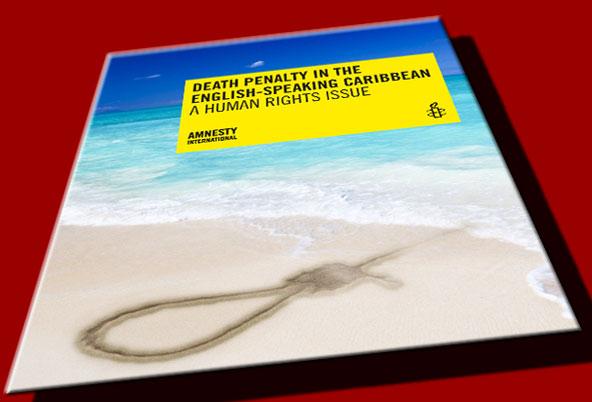
Article(s)
Call to end flawed Caribbean death penalty
By Thomas Hubert, on 10 December 2012
An appeal signed by local organizations and a new report by Amnesty International denounce multiple human rights violations in the use of capital punishment in the region and ask governments to “remove the death penalty once and for all from the law books”.
2012
Antigua and Barbuda
Bahamas
Barbados
Belize
Dominica
Fair Trial
Grenada
Guyana
Intellectual Disability
Jamaica
Mental Illness
Saint Kitts and Nevis
Saint Lucia
Saint Vincent and the Grenadines
Trinidad and Tobago
Document(s)
Keep the Death Penalty Abolished in the Philippines (Ilokano)
By World Coalition Against Death Penalty, on 23 March 2021
2021
Campaigning
Drug Offenses
Philippines
More details Download [ pdf - 2550 Ko ]
This brochure was developed by the World Coalition Against the Death Penalty with the Commission on the Human Rights in the Philippines. It explains why the death penalty risks returning in the Philippines and the reasons against its resurgence. It is available in 11 languages of the Philippines, plus French and English.
- Document type Campaigning
- Countries list Philippines
- Themes list Drug Offenses
Article(s)
What now for Mumia?
on 28 April 2008
On 27 March, a US federal appeals court overturned Mumia Abu-Jamal’s death sentence, but not his conviction for murder. His lead counsel Robert R. Bryan gives his reaction to the ruling and the next steps in America’s most high-profile capital case.
2008
Fair Trial
United States
Article(s)
Indonesian activists face upward death penalty trend
on 10 February 2009
Indonesia-based researcher Dave McRae finds that a core group of abolitionists are battling a rise in the number of executions, death sentences and death row inmates in the country.
2009
Cruel, Inhuman and Degrading Treatment and Punishment
Drug Offenses
Indonesia
Public Opinion
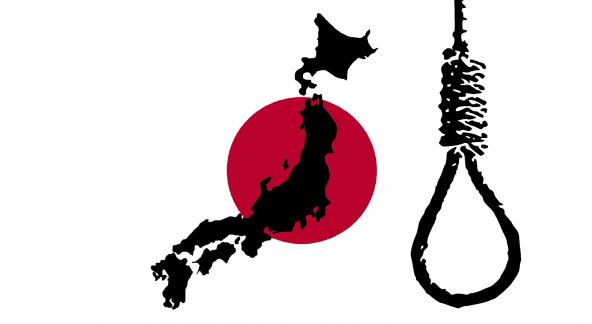
Article(s)
Regarding the execution in Japan of seven people
By World Coalition Against the Death Penalty, on 10 July 2018
STATEMENT – WORLD COALITION AGAINST THE DEATH PENALTY The World Coalition Against the Death Penalty would like to express its sympathy and support to all courageous anti-death penalty activists who have fought bravely to try to prevent the executions of seven people in Japan on the same day, on 6 July. The World Coalition calls […]
2018
Japan
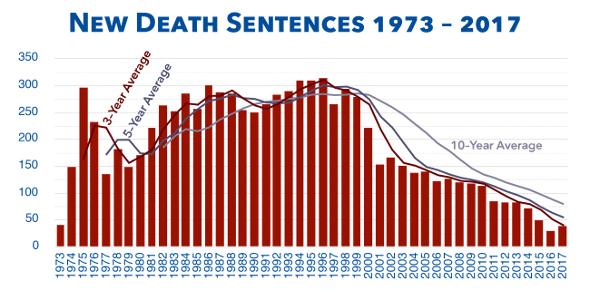
Article(s)
U.S. sees second fewest death sentences and executions in 25 Years
By Death Penalty Information Center, on 22 March 2018
Public support for the death penalty drops to 45-Year low as four More death-row prisoners Exonerated in 2017. “The Death Penalty in 2017: Year End Report” is now available.
2018
United States
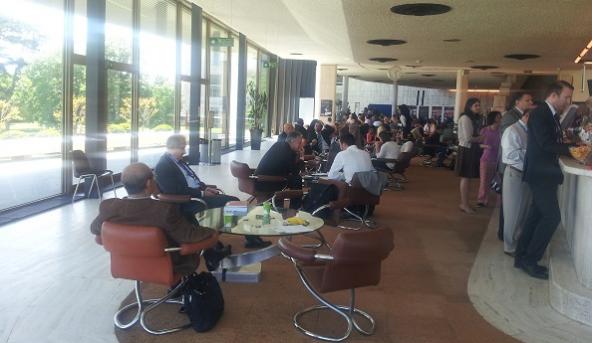
Article(s)
Abolitionist NGOs lobby to educate UN member states in Geneva
By Aurélie Plaçais, on 22 April 2015
Several World Coalition members carried out intense advocacy activities during and after the March session of the Human Rights Council to prepare for the coming UPR session, during which Liberia, Malawi and the USA will be examined.
2015
Article(s)
A World Without the Death Penalty – IX Congress of the Ministers of Justice
By Federica Merenda, on 29 February 2016
On 22 February 2016, the representatives of more than twenty countries gathered in Rome for the 9th International Congress of the Ministers of Justice « A World without the death penalty », organized by the Community of Sant’Egidio and hosted by the Italian Chamber of Deputies. Burundi, Cambodia, Central African Republic, Congo, El Salvador, Guinea Conakry, Cȏte d’Ivoire, Mali, Mongolia, Rwanda, Somalia, Sri Lanka, South Africa, Timor-Leste, Togo, Uganda, Viet Nam, Zimbabwe are the countries who joined Italy in the last edition of this annual conference.
2016
Article(s)
Web-Editor
By World Coalition Against the Death Penalty, on 17 October 2016
The World Coalition Against the Death Penalty is recruiting a Web-editor for its website.
2016
Article(s)
Translations in Chinese
By World Coalition Against the Death Penalty, on 21 January 2013
The World Coalition Against the Death Penalty’s office in Paris, France, is currently calling for translation contributions in Chinese.
The objective is to award contracts for translation services for the publications of the World Coalition Against the Death Penalty for 30 months (mid 2013 – mid 2015).
2013
Article(s)
Web-Editor
By World Coalition Against the Death Penalty, on 9 October 2018
The World Coalition Against the Death Penalty is recruiting a Web-editor/Editorial Webmaster for its website.
2018

Article(s)
Lindy Lou Juror #2
By Clémentine Etienne, on 31 July 2018
On the occasion of the screening of the movie Lindy Lou Juror number 2 on Monday 25 June 2018, abolitionist associations such as Amnesty International, ACAT France, Together Against The Death Penalty French Collectif Free Mumia! and the World Coalition against the Death Penalty met at the Centre Wallonie Bruxelles in Paris.
2018
Public Opinion
United States
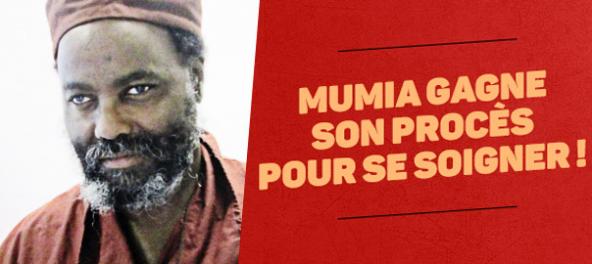
Article(s)
Federal Justice orders the prison administration to immediately provide African-American journalist Mumia Abu-Jamal with treatment
By French Collective "Free Mumia", on 18 January 2017
On the 3rd January of this year, a Federal judge ordered Pennsylvania’s prison administration to immediately provide Mumia Abu-Jamal with medication to treat his hepatitis C infection, justifying his decision in these terms: “budgetary constraints cannot outweigh the Eighth Amendment’s constitutional guarantee of adequate medical care.”
2017
Cruel, Inhuman and Degrading Treatment and Punishment
United States
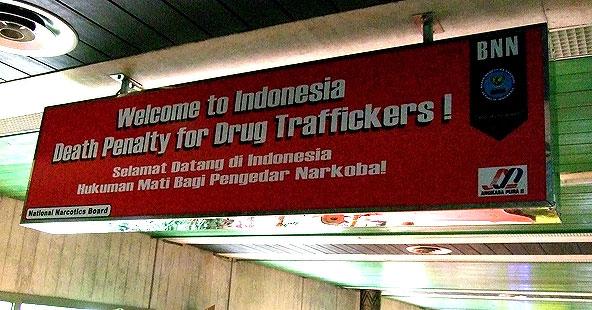
Article(s)
Indonesia: execution for drug crimes is no solution
By World Coalition Against the Death Penalty, on 26 January 2015
In an open letter, the World Coalition and its members, including KONTRAS and Amnesty International, condemn the Indonesian government’s politicizing of the death penalty to show its commitment to eradicating drug-related crimes. Recent resumptions of executions show one thing, they are carried out for political reasons only: in Pakistan to show that it is tough on terrorism, Jordan that it tough on crime and Indonesia that it is tough on drugs. Instead, those states should abolish the death penalty to show their commitment to upholding human rights. The next World Day against the Death Penalty will be dedicated to the issue of capital drug crimes.
2015
Drug Offenses
Indonesia
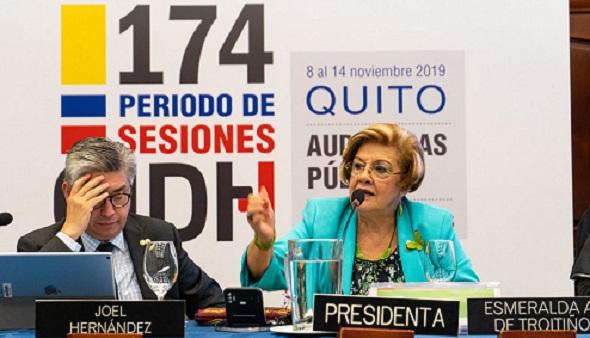
Article(s)
The Inter-American system commits to see the end of the death penalty
By World Coalition Against the Death Penalty, on 13 January 2020
In November 2019, Ecuador hosted a series of high level meetings of the Organisation of American States (OAS), including the Third Forum of the Inter-American Human Rights System and the 174th Period of Sessions of the Inter-American Commission on Human Rights (IACHR), during which abolition of the death penalty was on the agenda.
2020

Article(s)
Ten films to expose innocence on death row
By Laura Shacham - One for Ten, on 29 April 2013
One For Ten is a series of short documentary films telling the stories of innocent people who were on death row in the United States, with support from the World Coalition and several of its members.
2013
Innocence
United States
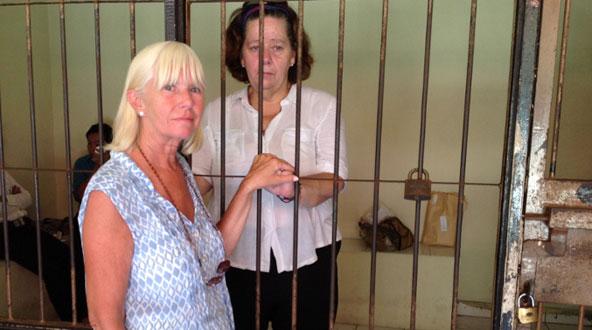
Article(s)
Briton’s death sentence puts Indonesians at risk
By KontraS, on 31 January 2013
The World Coalition’s Indonesian member organization KontraS has raised the international consequences of Lindsay Sandiford’s high-profile capital case in an opinion article published by the Jakarta Globe newspaper, calling on the country to abolish the death penalty.
2013
Drug Offenses
Indonesia
Moratorium
Document(s)
Maldives – Committee Against Torture (LOIPR) – Death Penalty – June 2022
By The Maldivian Democracy Network (MDN) , on 21 July 2022
2022
NGO report
World Coalition
Cruel, Inhuman and Degrading Treatment and Punishment
Maldives
More details Download [ pdf - 1443 Ko ]
This report addresses the Maldives’ compliance with its human rights obligations with respect to the death penalty. Despite its long-standing, de facto moratorium on executions, the Maldives sentenced two people to death in 2019, after sentencing no one to death in 2018.[1] At the end of 2019, there were 19 people on death row in the Maldives – three of whom had exhausted their appeals and five of whom were juveniles when the crime was committed.[2] The Maldives sentenced another individual to death in 2022, which represented the first time the country sentenced a foreign national to death.[3] The continued use of the death penalty in sentencing is particularly concerning given evidence of due process violations, including the use of torture to obtain confessions, the lack of effective and accessible complaint mechanisms for detained individuals, the lack of an independent judiciary, and the use of the death penalty as a sentence for crimes committed by juveniles.
- Document type NGO report / World Coalition
- Countries list Maldives
- Themes list Cruel, Inhuman and Degrading Treatment and Punishment
Article(s)
Research Assistant
By Death Penalty Worldwide, Cornell Law School and World Coalition Against the Death Penalty, on 8 February 2016
Death Penalty Worldwide of Cornell University Law School and the World Coalition Against the Death Penalty invite applications for a five-month internship placement in Paris from March to July 2016.
2016
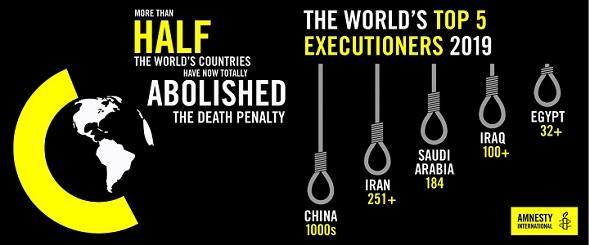
Article(s)
Death penalty in 2019: Facts and figures
By Amnesty International, on 22 April 2020
Amnesty International published its annual report on death sentences and executions worldwide on 21 April 2020. It showed that the number of known executions decreased slightly on the 2018 total, reaching the lowest figure in more than 10 years, despite Iraq nearly doubling its tally and Saudi Arabia having its highest executions total in any given year.
2020

Article(s)
Bahrain: Joint appeal for commutation and moratorium
By Salam for Democracy and Human Rights, on 13 January 2022
Joint Appeal was published on World Day Against the Death Penlaty on 10 October 2021 and sent to the Bahraini Embassy in France, UK and Switzerland.
2022
Bahrain
Clemency
Moratorium
Document(s)
Sentenced to Death Without Execution
on 15 December 2020
2020
NGO report
Antigua and Barbuda
Barbados
Dominica
Grenada
Saint Kitts and Nevis
Saint Lucia
Saint Vincent and the Grenadines
Trend Towards Abolition
More details Download [ pdf - 1597 Ko ]
This research is a contribution towards understanding why six small, independent island nations in the
Eastern Caribbean – Antigua and Barbuda, Dominica, Grenada, St Kitts and Nevis, St Lucia, and St
Vincent and the Grenadines, all members of the OECS – and the neighbouring island of Barbados retain
the death penalty in their criminal statutes, and yet have not executed anyone sentenced to death for a
very long time. With the exception of St Kitts and Nevis, where an execution took place in 2008, no-one
has been judicially executed in any of the other countries for more than 20 years – and in Dominica,
Grenada, St Lucia and Barbados for more than 30 years. Furthermore, death sentences have been imposed
within the past 10 years only in St Lucia and Barbados, and in four of these seven nations no-one is under
sentence of death on ‘death row’ at the time of writing.
The questions posed by this publication are: why do these countries hang on to capital punishment
and what are the barriers and hindrances to the complete abolition of capital punishment by these
nations
- Document type NGO report
- Countries list Antigua and Barbuda / Barbados / Dominica / Grenada / Saint Kitts and Nevis / Saint Lucia / Saint Vincent and the Grenadines
- Themes list Trend Towards Abolition
Document(s)
The Modern Federal Death Penalty: A Cruel and Unusual Penalty
By Hannah Freedman, on 1 September 2022
2022
Academic report
Cruel, Inhuman and Degrading Treatment and Punishment
United States
More details See the document
The federal death penalty today would be unrecognizable to the founders, who saw the ultimate penalty as a means of protecting sovereign interests and who therefore carefully guarded the practice at English common law of yielding national interests to local ones. Over the course of time, the geographic distribution and substantive basis for the penalty changed, but until the modern era, its underlying purpose did not. As the Trump era executions made painfully clear, however, the federal death penalty today is different. It is disproportionately imposed for crimes that could have readily been prosecuted by other jurisdictions and that have little obvious connection to federal sovereignty, and it is disproportionately imposed against non-white people. By any rational measure, it is vanishingly rare, and it serves no valid penological goal. Simply put, federal death sentences today are, in most cases, “cruel and unusual in the same way that being struck by lightning is cruel and unusual.”
- Document type Academic report
- Countries list United States
- Themes list Cruel, Inhuman and Degrading Treatment and Punishment

Member(s)
The American Constitution Society (ACS)
on 5 September 2022
The American Constitution Society (ACS) is a United States-based network of progressive lawyers, law students, judges, policymakers, legislators, and academics dedicated to realizing the promises of the U.S. Constitution by advancing and defending democracy, justice, equality, and liberty; securing a government that serves the public interest; and guarding against the abuse of law and the […]
2022
United States
Document(s)
Detailed Factsheet 2010
By World Coalition against the death penalty , on 10 October 2010
2010
Campaigning
Trend Towards Abolition
frMore details Download [ pdf - 479 Ko ]
Detailed Factsheet 2010
- Document type Campaigning
- Themes list Trend Towards Abolition
- Available languages Fiche détaillée 2010
Document(s)
Children, Youth and the Death Penalty
By International Commission against the Death Penalty, on 23 June 2023
2023
NGO report
Juveniles
More details See the document
ICDP announces the launch of its latest report: Children, Youth and the Death Penalty. The issue of how the death penalty affects children and youth is often ignored by policy makers. This report aims to change that by putting the protection of children’s rights at the center of the debate on the death penalty.
The report builds on the panel discussion titled “Youth and the Death Penalty,” which was organized by the International Commission against the Death Penalty (ICDP) and the Government of Australia. The discussion was held on 29 June 2022, at the sidelines of the 50th session of the UN Human Rights Council, in Geneva.
- Document type NGO report
- Themes list Juveniles

Member(s)
Reprieve
on 30 April 2020
Reprieve is a small, feisty registered charitable organisation of human rights defenders. Our strategy is to use strategic interventions to end the use of the death penalty globally, and to end extreme human rights abuses carried out in the name of “counterterrorism” or “national security” We work for among the most disenfranchised people in society, […]
2020
United Kingdom
Document(s)
Ethiopia – Committee Against Torture (LOI) – Death Penalty – June 2022
on 21 July 2022
2022
NGO report
World Coalition
Ethiopia
More details Download [ pdf - 1447 Ko ]
This report addresses Ethiopia’s compliance with its human rights obligations with regard to the death penalty. Although there are currently at least 147 people on death row in Ethiopia, the country has not carried out any executions during the reporting period and has also pardoned and released 41 additional death row inmates since that time.[1] The Federal Supreme Court of Ethiopia has also issued sentencing guidelines that purport to further reduce the likelihood of persons being sentenced to death as a punishment for their crimes.[2] Nonetheless, Ethiopia has not taken concrete steps to reduce the number of crimes eligible for the death penalty, and the use of torture and other due process violations related to judicial proceedings render all death sentences arbitrary.
- Document type NGO report / World Coalition
- Countries list Ethiopia
Document(s)
Right Here, Right Now Life Stories from America’s Death Row
By Lynden Harris, on 10 August 2021
2021
Book
Death Row Conditions
United States
More details See the document
Upon receiving his execution date, one of the thousands of men living on death row in the United States had an epiphany: “All there ever is, is this moment. You, me, all of us, right here, right now, this minute, that’s love.”
Right Here, Right Now collects the powerful, first-person stories of dozens of men on death rows across the country. From childhood experiences living with poverty, hunger, and violence to mental illness and police misconduct to coming to terms with their executions, these men outline their struggle to maintain their connection to society and sustain the humanity that incarceration and its daily insults attempt to extinguish.
By offering their hopes, dreams, aspirations, fears, failures, and wounds, the men challenge us to reconsider whether our current justice system offers actual justice or simply perpetuates the social injustices that obscure our shared humanity.
- Document type Book
- Countries list United States
- Themes list Death Row Conditions
Document(s)
Broken Promises: How a History of Racial Violence and Bias Shaped Ohio’s Death Penalty
By Death Penalty Information Center , on 14 May 2024
2024
NGO report
Fair Trial
Innocence
Trend Towards Abolition
United States
More details See the document
In January 2024, Ohio lawmakers announced plans to expand the use of the death penalty to permit executions with nitrogen gas, as Alabama had just done a week earlier. But at the same time the Attorney General and the Ohio Prosecuting Attorneys Association are championing this legislation, a bipartisan group of state legislators has introduced a bill to abolish the death penalty based on “significant concerns on who is sentenced to death and how that sentence is carried out.” The competing narratives make it more important than ever for Ohioans to have a meaningful, accurate understanding of how capital punishment is being used, including whether the state has progressed beyond the mistakes of its past.
- Document type NGO report
- Countries list United States
- Themes list Fair Trial / Innocence / Trend Towards Abolition
Document(s)
Death Penalty Politics: The Fragility of Abolition in Asia and the Pacific
By Mark Finnane, Mai Sato and Susan Trevaskes, on 1 September 2022
2022
Academic report
More details See the document
Despite a steady increase worldwide in the number of states that have abolished the death penalty, capital punishment remains a troubling presence in the international order. The world’s leading powers in terms of economics and population include the retentionist states of China, India, Japan and the United States of America (USA). It seems there is no linear path to abolition, and its achievement is indeterminate. Yet, in international human rights law, death penalty abolition is a powerful norm embraced by half the countries across the world. While the majority of death penalty research has emanated from and focuses on the USA, well over 90 per cent of global executions occur in Asia, which lags behind the global trend towards abolishing the death penalty. Our symposium and this collection seek to bring perspectives from a variety of disciplines and methods—historical, legal, sociological, comparative— to bear on the questions of retention and abolition in a variety of jurisdictions and time periods.
This article was first published in Crime Justice Journal: https://www.crimejusticejournal.com/issue/view/119
- Document type Academic report
Document(s)
Abolition of the Death Penalty in the Eastern Caribbean and Barbados
on 15 December 2020
2020
Lobbying
Barbados
Trend Towards Abolition
More details Download [ pdf - 2611 Ko ]
Greater Caribbean for Life has launched its educational toolkit to assist activists and organisations as they work toward abolishing the death penalty in the Greater Caribbean. The production of this toolkit forms part of GCL’s activities under its EU partnered project to educate on death penalty abolition in the Eastern Caribbean and Barbados.
The launch of the toolkit is timely as a few of these target countries recently voted against adopting the UN Moratorium on the use of the death penalty and countries that had previously chosen to abstain have now firmly voted against the resolution.
GCL members condemn the rise of violent crime in our region and express solidarity and compassion with the victims of crime, however, we reject the notion that capital punishment will act as a deterrent or foster respect for life in our communities.
It is our hope that this toolkit will assist in promoting respect for the right to life for all human beings in the Caribbean region.
- Document type Lobbying
- Countries list Barbados
- Themes list Trend Towards Abolition
Document(s)
Intiatives World Day 2005
By World coalition against the death penalty , on 10 October 2005
2005
Campaigning
Trend Towards Abolition
frMore details See the document
Intiatives World Day 2005
- Document type Campaigning
- Themes list Trend Towards Abolition
- Available languages Initiatives journée mondiale 2005
Document(s)
UN Special Procedures toolkit – World Day 2023
By FIACAT and the World Coalition Against the Death Penalty, on 18 September 2023
2023
World Coalition
frMore details Download [ pdf - 345 Ko ]
There are several ways in which individuals and non-governmental organizations (NGOs) can work with the UN to report human rights violations. One way is through the special procedures of the UN Human Rights Council (HRC). Find out how to work with them here.
- Document type World Coalition
- Available languages Travailler avec les Procédures spéciales des Nations unies - Journée mondiale 2023
Document(s)
UN Special Procedures toolkit – World Day 2022
By FIACAT and the World Coalition Against the Death Penalty, on 26 September 2022
2022
World Coalition
frMore details Download [ pdf - 335 Ko ]
There are several ways in which individuals and non-governmental organizations (NGOs) can work with the UN to report human rights violations. One way is through the special procedures of the UN Human Rights Council (HRC). Find out how to work with them here.
- Document type World Coalition
- Available languages Travailler avec les Procédures spéciales des Nations unies - Journée mondiale 2022

Member(s)
Grupo de Apoyo Mutuo (GAM)
on 30 April 2020
Mandate and goals: Organization of relatives of missing persons illegally detained which works for justice, investigating past cases, opening legal proceedings against the national system and the human rights system. Kind of actions: We work for justice, for the strengthening of the institutions linked to the criminal investigation and against the death penalty. Actions aiming […]
2020
Guatemala
Document(s)
Ripoti Ya Kimataifa Ya Amnesty International Hukumu Za Kifo Na Watu Walionyongwa 2022
By Amnesty International, on 16 May 2023
2023
NGO report
More details See the document
Utafiti wa Amnesty International kuhusu matumizi ya adhabu ya kifo mwaka wa 2022 ulionyesha kwambakulikuwa na ongezeko kubwa la idadi ya watu wanaojulikana kuwa walinyongwa duniani, likiwemo ongezekokubwa la watu walionyongwa kutokana na makosa yanayohusiana na dawa za kulevya
- Document type NGO report
Document(s)
Taiwan: Amicus Curiae submission by Amnesty International and the World Coalition Against the Death Penalty to the Constitutional Court
By Amnesty International, on 23 April 2024
2024
NGO report
Taiwan
zh-hantMore details See the document
Published on April 8, 2024.
As the Constitutional Court of the Republic of China considers a challenge to the constitutionality of the death penalty, Amnesty International Taiwan and the World Coalition Against the Death Penalty submitted a joint amicus curiae intervention, to ensure the protection of the rights of all those under sentence of death. The amicus interveners argue that the use of the death penalty in the Republic of China constitutes a violation of human rights as guaranteed under the Constitution and international law and standards; and sets the country against the global trend, which remains overwhelmingly in favour of abolition.
- Document type NGO report
- Countries list Taiwan
- Available languages 憲法法庭法庭之友意見書 主案案號:111年度憲民字第904052號 法庭之友:國際特赦組織台灣分會 均詳委任狀 代 表 人:林綉娟 理事長 代 理 人:陳瑋珊 律師 均詳委任狀 均詳委任狀

Member(s)
Academic University for Non-Violence and Human Rights – AUNOHR
on 14 July 2023
AUNOHR, www.aunohr.edu.lb, the Academic University for Non-Violence and Human Rights, is a non-profit independent institution of higher education, first-of-its-kind in Lebanon and the region and unique worldwide. Founded in 2014 after a pilot project (2009-2011), its main objectives are both: academic professionalism and for social change, starting with the personal development of every student. The […]
2023
Lebanon
Document(s)
FHRI and PRI submission to the UN Sec-Gen report on the status of the death penalty in East Africa – Kenya and Uganda April 2012
By Penal Reform International, on 8 September 2020
2020
NGO report
Kenya
More details See the document
To date, Kenya and Uganda have not signed the Second Optional Protocol to the International Covenant on Civil and Political Rights and are not party to any international or regional treaty prohibiting the death penalty. While Kenya abstained from voting in the 2010 UN General Assembly moratorium resolution, Uganda voted against it and signed the note verbale of issociation.
- Document type NGO report
- Countries list Kenya
- Themes list Cruel, Inhuman and Degrading Treatment and Punishment, Discrimination, Country/Regional profiles,
Article(s)
167 Ugandan death row inmates saved from gallows
on 19 September 2010
Recent figures show that a January ruling by the Ugandan supreme court making it illegal to keep people on death row for more than three years has saved 167 lives.
2010
Cruel, Inhuman and Degrading Treatment and Punishment
Uganda
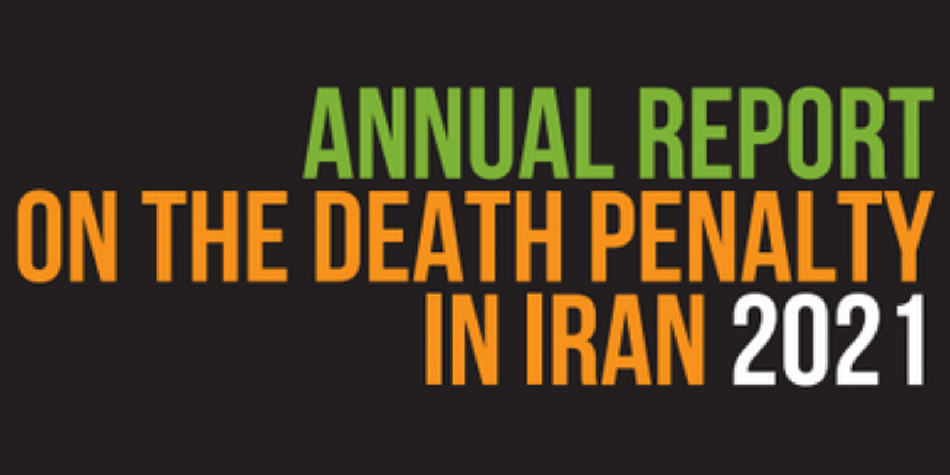
Article(s)
Death Penalty in Iran: Sharp Increase in Executions
By Anissa Aguedal, on 10 June 2022
An alarming situation On 28 April 2022, Iran Human Rights (IHR) and Ensemble contre la peine de mort (ECPM) released their 14th Annual Report on the Death Penalty in Iran, revealing an increase in the number of executions in 2021. At least 333 people were executed and 83,5% of these executions were not announced by […]
2022
Iran (Islamic Republic of)
Document(s)
Defending Women and Transgender Persons Facing Extreme Sentences: A Practical Guide
on 14 January 2022
2022
Legal Representation
Legal Representation
Women
frMore details See the document
Written by a team including experts in the fields of capital defense, gender rights, gender-sensitive mitigation and the rights of transgender persons, the guide includes sections on gender-based violence, women’s mental health, prison conditions, discrimination in the legal system, working with the media, and how to build a gender-sensitive team. It also includes a step-by-step gender-sensitive interview protocol that builds on resources developed by the anti-violence community and is tailored to the needs of defense teams.
- Document type Legal Representation
- Themes list Legal Representation / Women
- Available languages Défendre les femmes et les personnes transgenres confrontées à des peines extrêmes
Document(s)
Death Penalty in the OSCE Area: Background Paper 2021
By Organization for Security and Co-operation in Europe (OSCE) , on 14 January 2022
Regional body report
Belarus
United States
ruMore details See the document
This paper updates The Death Penalty in the OSCE Area: Background Paper 2020. It is intended to provide a concise update to highlight changes in the status of the death penalty in OSCE participating States since the previous publication and to promote constructive discussion of the issue. It covers the period from 1 April 2020 to 31 March 2021. Special Focus: The road to abolition in selected OSCE participating States
- Document type Regional body report
- Countries list Belarus / United States
- Available languages Смертная казнь в регионе ОБСЕ, Справочный документ 2021 года
Document(s)
Leaflet – World Day 2024 & 2025
By World coalition against the death penalty, on 10 June 2024
2024
Campaigning
World Coalition
frMore details Download [ pdf - 1325 Ko ]
Every 10th October, the World Coalition Against the Death Penalty and abolitionist actors worldwide celebrate the World Day Against the Death Penalty. It is an occasion to highlight the progress achieved in the global campaign for the abolition of capital punishment. In 2024 and 2025, the World Day will serve as an opportunity to challenge […]
- Document type Campaigning / World Coalition
- Available languages Brochure - Journée mondiale 2024 & 2025
Document(s)
Children who are Impacted by a Family Member’s Death Sentence or Execution: Information for Mental Health Professionals
By National Child Traumatic Stress Network (NCTSN), Texas after violence project, Clinical and Support Options, on 11 December 2021
2021
Working with...
Juveniles
More details See the document
This tip sheet provides some guidelines for mental health professionals who may encounter or work with children and families related to individuals who have been sentenced to death or executed.
- Document type Working with...
- Themes list Juveniles

21st World Day Against the Death Penalty – The death penalty: An irreversible torture
on 12 June 2023
2023
Cruel, Inhuman and Degrading Treatment and Punishment
Death Row Conditions
Page(s)
Newsletter
on 22 June 2020
With our monthly newsletter, make sure that you do not miss out on the latest information on the abolition of the death penalty. Subscribe to receive the latest articles published on the site, new documents available in the library as well as the agenda of our members. You can also sign up for our quarterly […]
2020

22nd World Day Against the Death Penalty – The death penalty protects no one.
on 12 June 2024
Observed every 10 October, the World Day Against the Death Penalty unifies the global abolitionist movement and mobilizes civil society, political leaders, lawyers, public opinion and more to support the call for the universal abolition of capital punishment.
2024
Public Opinion
Trend Towards Abolition
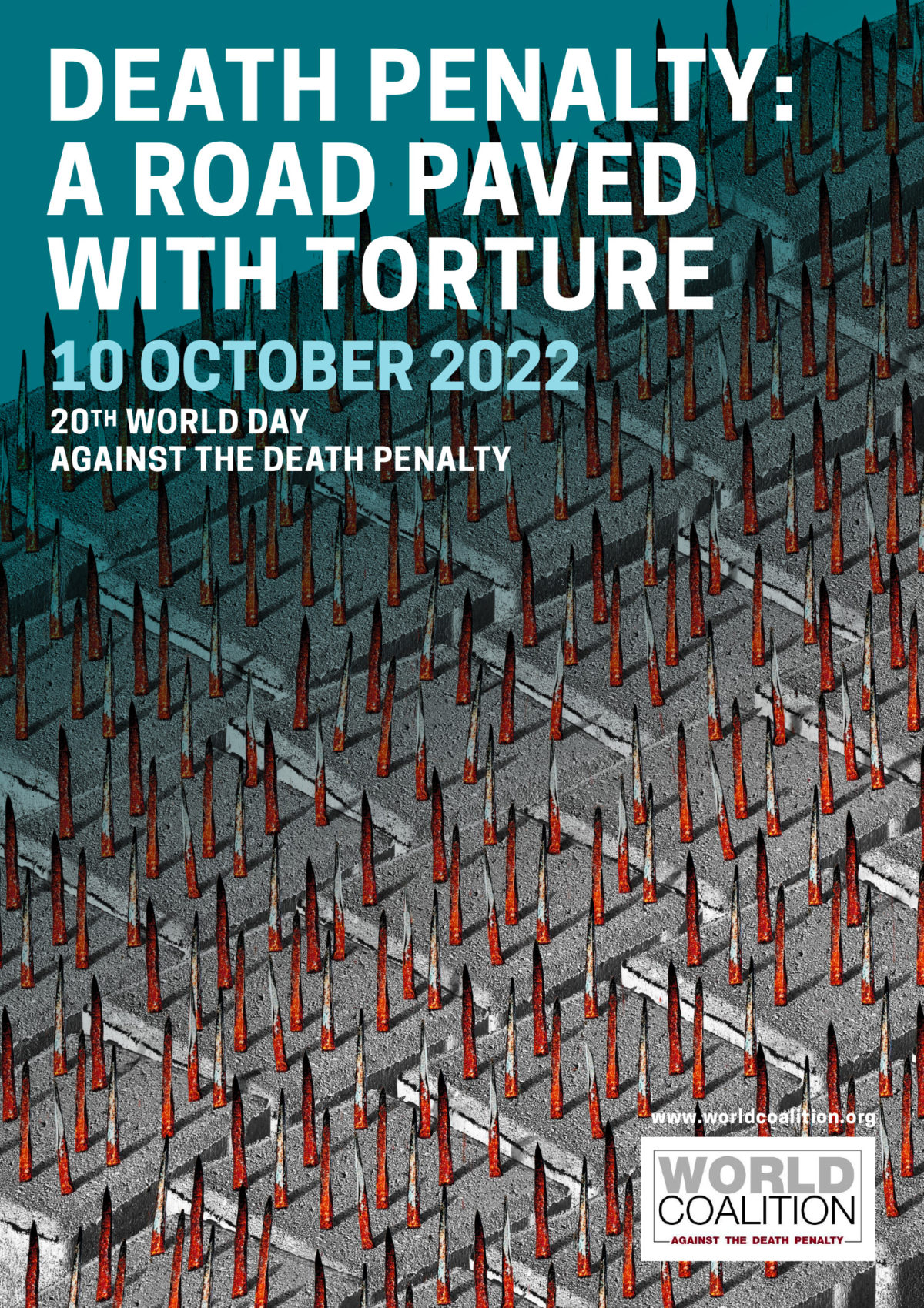
20th World Day Against the Death Penalty – Death penalty: a road paved with torture
on 10 June 2022
As the 20th World Day Against the Death Penalty is marked around the world, now is a time to consider and celebrate the gains the abolitionist movement has made over the past 20 years. Now, more than ever, abolitionist actors need to continue working towards the complete abolition of the death penalty worldwide, for all […]
2022
Cruel, Inhuman and Degrading Treatment and Punishment
Death Row Conditions

Member(s)
Comitato Paul Rougeau
on 30 April 2020
Paul Rougeau was sentenced to death in Texas for the murder of an off-duty policeman. He always maintained he was innocent. In 1992, after he had spent 15 years on death row, the Italian newspaper Il Manifesto printed a letter by Paul Rougeau on its front page. A group of Italian citizens then decided to […]
2020
Italy
Document(s)
Leaflet – World Day 2022
By the World Coalition Against the Death Penalty, on 24 June 2022
2022
World Coalition
arfrMore details Download [ pdf - 1095 Ko ]
Leaflet for the 20th World Day against the death penalty (2022), on torture and the death penalty.
- Document type World Coalition
- Available languages للیوم العالمي لمناھضة عقوبة الإعدام كتيب باللغة العربيةBrochure - Journée mondiale 2022
Document(s)
Co-Sponsorship, Note Verbale, and Association Behaviour at the Unga: An Analysis of the Death Penalty Moratorium Resolutions
By Daniel Pascoe & Sangmin Bae, on 22 April 2021
2021
Academic report
Moratorium
More details See the document
Since December 2007, seven resolutions in favour of a universal moratorium on death penalty executions have been adopted by the UN General Assembly. In an earlier paper (Pascoe and Bae 2020) we examined UN member states’ voting patterns over these seven resolutions, asking why some countries vote in a manner seemingly contradictory to their domestic death penalty practices. With a slightly different focus, we now further explore idiosyncratic state behaviour, this time through an analysis of co-sponsorship and the note verbale of dissociation. Our assumption is that states which plan to vote ‘yes’ in the plenary will also co-sponsor the resolution beforehand. We also presume that states which vote ‘no’ in the plenary will sign the note verbale invariably circulated several months later, as a further means of condemnation.
However, when it comes to the moratorium resolutions, not all member states fit into either of these binary categories. Many countries situate themselves in between the two groups of ‘genuine’ supporters and opponents. These countries in the middle evince inconsistency between their plenary votes and what we term their ‘association behaviour’ before or after the plenary, consisting of co-sponsorship and adherence to the note verbale. This paper analyses these groups of countries to determine the underlying causes for their ambivalent, or even contradictory, positions concerning the moratorium resolutions. The findings of this research stand to enrich not only the academic literature on international organizations, but also to inform the campaigning efforts of abolitionist UN member states and non-governmental organizations.
- Document type Academic report
- Themes list Moratorium

Member(s)
Free Mumia! French Support Group
on 30 April 2020
Founded in 1995, the French collective “Libérons Mumia” brings together about a hundred organisations and public authorities: human rights associations, trade unions, political parties, local and regional collectives and local authorities. His objective is to obtain a new trial allowing the Black American journalist Mumia to defend his innocence and regain his freedom. Mumia Abu-Jamal […]
2020
France

Member(s)
Prison Insider
on 30 April 2020
Prison Insider is a French independent NGO. Prison Insider’s main mission is to raise awareness about the conditions of detention and to promote the rights and dignity of people deprived of liberty, everywhere in the world. To reach its aims, the organisation primarily operates an information website. Prison Insider’s vocation is to make available and […]
France
Document(s)
‘Upholding the Cause of Civilization’: The Australian Death Penalty in War and Colonialism
By Mark Finnane, on 1 September 2022
2022
Academic report
Australia
More details See the document
The abolition of the death penalty in Queensland in 1922 was the first in Australian jurisdictions, and the first in the British Empire. However, the legacy of the Queensland death penalty lingered in Australian colonial territories. This article considers a variety of practices in which the death penalty was addressed by Australian decision-makers during the first half of the 20th century. These include the exemption of Australian soldiers from execution in World War I, use of the death penalty in colonial Papua and the Mandate Territory of New Guinea, hanging as a weapon of war in the colonial territories, and the retrieval of the death penalty for the punishment of war crimes. In these histories, we see not only that the Queensland death penalty lived on in other contexts but also that ideological and political preferences for abolition remained vulnerable to the sway of other historical forces of war and security.
This article was first pubished in Crime Justice Journal: https://www.crimejusticejournal.com/issue/view/119
- Document type Academic report
- Countries list Australia
Document(s)
Holdouts in the South Pacific: Explaining Death Penalty Retention in Papua New Guinea and Tonga
By Daniel Pascoe and Andrew Novak, on 1 September 2022
Academic report
Papua New Guinea
Tonga
More details See the document
The South Pacific forms a cohesive region with broadly similar cultural attributes, legal systems and colonial histories. A comparative analysis starts from the assumption that these countries should also have similar criminal justice policies. However, until 2022, both Papua New Guinea and Tonga were retentionist death penalty outliers in the South Pacific, a region home to seven other fully abolitionist members of the United Nations. In this article, we use the comparative method to explain why Papua New Guinea and Tonga have pursued a different death penalty trajectory than their regional neighbours. Eschewing the traditional social science explanations for death penalty retention, we suggest two novel explanations for ongoing retention in Papua New Guinea and Tonga: the law and order crisis in the former and the traditionally powerful monarchy in the latter.
This article was first published in Crime Justice Journal: https://www.crimejusticejournal.com/issue/view/119
- Document type Academic report
- Countries list Papua New Guinea / Tonga
Document(s)
Framing Death Penalty Politics in Malaysia
By Thaatchaayini Kananatu, on 1 September 2022
Academic report
Malaysia
More details See the document
The death penalty in Malaysia is a British colonial legacy that has undergone significant scrutiny in recent times. While the Malaysian Federal Constitution 1957 provides that ‘no person shall be deprived of his life or personal liberty save in accordance with law’, there are several criminal offences (including drug-related crimes) that impose the mandatory and discretionary death penalty. Using Benford and Snow’s framing processes, this paper reviews death penalty politics in Malaysia by analysing the rhetoric of abolitionists and retentionists. The abolitionists, comprising activist lawyers and non-government organisations, tend to use ‘human rights’ and ‘injustice’ frames, which humanise the ‘criminal’ and gain international support. The retentionists, such as victims’ families, use a ‘victims’ justice’ frame emphasising the ‘inhuman’ nature of violent crimes. In addition, the retentionist state shifts between ‘national security’ and ‘national development’ frames. This paper finds that death penalty politics in Malaysia is predominantly a politics of framing.
This article was first published in Crime Justice Journal: https://www.crimejusticejournal.com/issue/view/119
- Document type Academic report
- Countries list Malaysia
Document(s)
(Not) Talking about Capital Punishment in the Xi Jinping Era
By Tobias Smith, Matthew Robertson and Susan Trevaskes, on 1 September 2022
Academic report
China
More details See the document
An investigation into the death penalty in the People’s Republic of China in the Xi Jinping era (2012–) shows that unlike previous administrations, Xi does not appear to have articulated a signature death penalty policy. Where policy in China is unclear, assessing both the quality and frequency of discourse on the topic can provide evidence regarding an administration’s priorities.
This article was first published in Crime Justice Journal: https://www.crimejusticejournal.com/issue/view/119
- Document type Academic report
- Countries list China
Document(s)
Ambivalent Abolitionism in the 1920s: New South Wales, Australia
By Carolyn Strange, on 1 September 2022
Academic report
Australia
More details See the document
In the former penal colony of New South Wales (NSW), a Labor government attempted what its counterpart in Queensland had achieved in 1922: the abolition of the death penalty. Although NSW’s unelected Legislative Council scuttled Labor’s 1925 bill, the party’s prevarication over capital punishment and the government’s poor management of the campaign thwarted abolition for a further three decades. However, NSW’s failure must be analysed in light of ambivalent abolitionism that prevailed in Britain and the US in the postwar decade. In this wider context, Queensland, rather than NSW, was the abolitionist outlier.
This article was first published in Crime Justice Journal: https://www.crimejusticejournal.com/issue/view/119
- Document type Academic report
- Countries list Australia
Document(s)
Legislative Expansion and Judicial Confusion: Uncertain Trajectories of the Death Penalty in India
By Anup Surendranath and Maulshree Pathak, on 1 September 2022
Academic report
India
More details See the document
The numbers and the politics of the death penalty in India tell very different stories, presenting complicated narratives for its future. The public reaction to instances of sexual violence and other offences over the last decade and the consequent political response has significantly strengthened the retention and expansion of the death penalty. This is reflected from the fact that that of all the death sentences that district courts impose, only about 5 percent get confirmed in India’s appellate system. However, does this mean there is growing scepticism about the death penalty in the Supreme Court of India? Unfortunately, the answer is far from simple. An assessment of the death penalty in India’s appellate courts during the last decade will demonstrate that a crime-centric approach has hindered any principled discomfort with the death penalty or the manner of its administration. In particular, the Supreme Court has faltered in high-profile death sentence cases (i.e., offences against the state and sexual violence cases), and its track record of commutations has very little to do with principled considerations on sentencing. This paper argues that the political and judicial imagination of the death penalty, as a necessary part of the response to crime, creates significant and unique challenges for the path towards abolition.
This article was first published in Crime Justice Journal: https://www.crimejusticejournal.com/issue/view/119
- Document type Academic report
- Countries list India
Document(s)
Anti–Death Penalty Advocacy: A Lawyer’s View from Australia
By Julian McMahon SC, on 1 September 2022
Article
Australia
More details See the document
This article reviews the executions of Australians in the region and the Australian responses over the past two decades. Informed by the author’s legal defence role in death penalty cases in Singapore and Indonesia and other countries, the article explores developments in anti–death penalty advocacy since 2015: the parliamentary enquiry, the ‘whole of government’ strategy led by the Department of Foreign Affairs and Trade and the efforts made by Australia and Australians in Asia.
This article was first published in Crime Justice Journal: https://www.crimejusticejournal.com/issue/view/119
- Document type Article
- Countries list Australia
Document(s)
Politics of International Advocacy Against the Death Penalty: Governments as Anti–Death Penalty Crusaders
By Mai Sato, on 1 September 2022
Academic report
More details See the document
Two-thirds of the countries worldwide have moved away from the death penalty in law or in practice, with global and regional organisations as well as individual governments working towards universal abolition. This article critically examines the narratives of these abolitionist governments that have abolished the death penalty in their country and have adopted the role of ‘moral crusaders’ (Becker 1963) in pursuit of global abolition. In 2018, the Australian Government, while being surrounded by retentionist states in Asia, joined the anti–death penalty enterprise along with the European Union, the United Kingdom and Norway. Using the concepts of ‘moral crusader’ (Becker 1963) and ‘performativity’ (Butler 1993), this article argues that advocacy must be acted on repeatedly for governments to be anti–death penalty advocates. Otherwise, these government efforts serve political ends in appearance but are simply a self-serving form of advocacy in practice.
This article was first published in Crime Justice Journal: https://www.crimejusticejournal.com/issue/view/119
- Document type Academic report
Document(s)
Debunking the deterrence theory
By World coalition against the death penalty, on 9 July 2024
2024
Campaigning
World Coalition
frMore details Download [ pdf - 593 Ko ]
- Document type Campaigning / World Coalition
- Available languages La théorie de la dissuasion démystifiée
Document(s)
Leaflet Lobbying
By World Coalition against the death penalty , on 10 October 2007
2007
Campaigning
Trend Towards Abolition
frMore details See the document
Leaflet Lobbying
- Document type Campaigning
- Themes list Trend Towards Abolition
- Available languages Brochure Lobbying 2007
Document(s)
Palestine – Committee Against Torture – Death Penalty – June 2022
on 21 July 2022
2022
NGO report
World Coalition
State of Palestine
More details Download [ pdf - 1747 Ko ]
The State of Palestine on 1 April 2014 ratified the Convention against Torture and Other Cruel, Inhuman or Degrading Treatment or Punishment. On 28 December 2017, the State of Palestine signed the Optional Protocol to the Convention against Torture and Other Cruel, Inhuman or Degrading Treatment or Punishment. On 18 March 2019, the State of Palestine also ratified the Second Optional Protocol to the International Covenant on Civil and Political Rights (ICCPR), which aims to abolish the death penalty. The State of Palestine has not yet abolished the death penalty. Indeed-as described herein-the 14 June 2007 split in power between the Palestinian Authority in Ramallah in the West Bank under President Abbas, and the Hamas movement in Gaza, has been followed by many documented executions in Gaza without the requisite signature of President Abbas, and Gazan military courts conduct trials of civilians, where they can be sentenced to death.
This report considers the prevalence of torture and other issues ancillary to the death penalty itself: confessions under torture or degrading treatment, due process, access to legal counsel, death-row conditions, and methods of execution.
- Document type NGO report / World Coalition
- Countries list State of Palestine
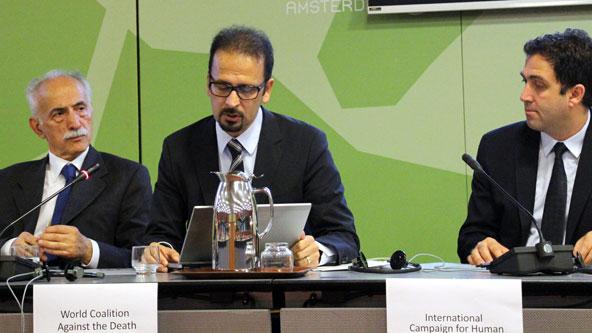
Article(s)
NGOs join forces to tackle capital punishment at Iran’s rights review
By Thomas Hubert, on 30 October 2014
Several World Coalition members are among organisations co-ordinating their efforts to help the international community put pressure on Iran over its use of the death penalty.
2014
Iran (Islamic Republic of)
Article(s)
World Day campaign launched!
on 13 August 2007
The countdown to the fifth World Day Against the Death Penalty on October 10 has begun. It will focus on the proposed resolution against capital punishment to be discussed in the UN this autumn.
2007
Moratorium
Article(s)
Youths must stand up against the death penalty!
on 17 September 2007
The Federation of Liberal Students (FEL), a Belgian political organisation, has just joined the World Coalition. FEL president Arnaud Van Praet explains his organisation’s mobilisation against capital punishment.
2007
Belgium
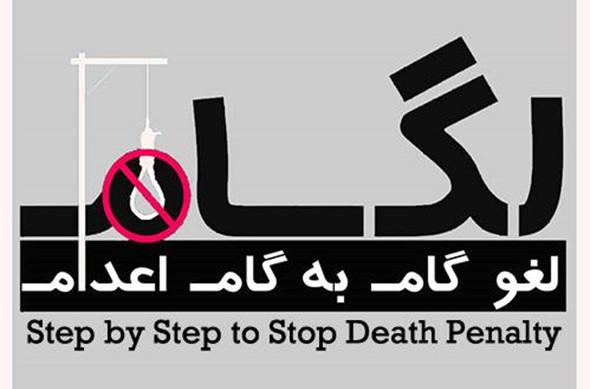
Article(s)
Iran’s brave human rights defenders and their struggle against the death penalty
By Amnesty International, on 5 March 2018
As the world moves away from the death penalty, Iran continues to execute hundreds of people every year and comes second only to China in the number of executions carried out annually. Amnesty International recorded nearly 1,000 executions in Iran in 2015 and at least 567 in 2016.
2018
Iran (Islamic Republic of)

Article(s)
Morocco’s death penalty takes centre stage at Marrakesh forum
By Thomas Hubert (in Marrakesh, Morocco), on 28 November 2014
Debates on the abolition of the death penalty at the World Human Rights Forum have highlighted the situation in the host country among the major fronts in the abolitionist struggle.
2014
Morocco
Article(s)
Hands Off Cain holds moratorium conference in Gabon
on 11 December 2007
The Italian-based abolitionist group organised the event in Libreville on December 10, Human Rights Day 2007, with the government of Gabon and financial backing from the Dutch government.
2007
Burundi
Democratic Republic of the Congo
Gabon
Gabon
Mali
Moratorium
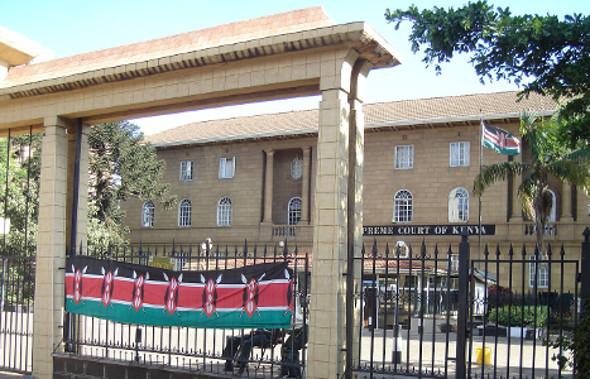
Article(s)
The Supreme Court of Kenya declares the mandatory death penalty unconstitutional
By Thalia Gerzso, on 23 January 2018
On December 14, 2017, the Supreme Court of Kenya declared the mandatory death penalty unconstitutional. This landmark decision puts an end to several years of uncertainties and constitutes an additional step towards the abolition of the death penalty in the country.
2018
Kenya
Article(s)
Abolition in the US: what role for overseas activists?
on 3 February 2008
As part of its 2008 annual conference, the National Coalition to Abolish the Death Penalty (NCADP) organised a brainstorming session to explore the question: “How can the international community support us in our efforts to abolish the death penalty in the US?”
2008
Clemency
Public Opinion
United States
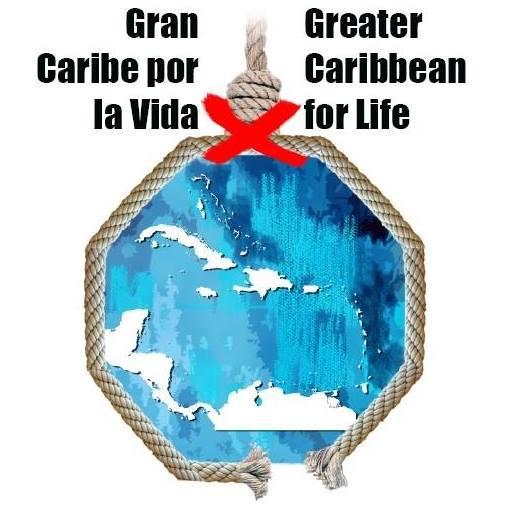
Article(s)
10 years with no hanging in the Caribbean
By Greater Caribbean for Life, on 19 December 2018
The Greater Caribbean for Life (GCL) notes that 19 December, 2018 marks the 10th anniversary of the hanging of Charles la Place in St Kitts and Nevis. He was the last person who was hanged in the English-speaking Caribbean.
2018
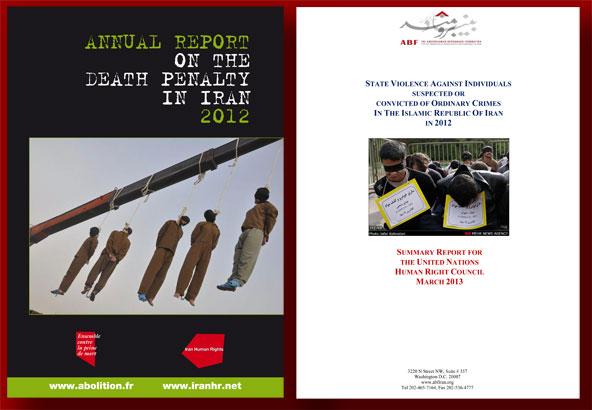
Article(s)
“Iran kills for possession of less than 50g of drugs”
By Thomas Hubert, on 9 April 2013
Annual reports published by two World Coalition member organizations of Iranian exiles expose the disproportionate use of the death penalty in Iran, mostly against drug users and traffickers.
2013
Drug Offenses
Iran (Islamic Republic of)
Article(s)
From Italian prisons to Texas death row
on 27 March 2008
A conference held near Naples, Italy last month helped around 200 attendees, most of them secondary school students, understand the death penalty situation in the US and relate it to prison issues in their own country.
2008
Death Row Conditions
Italy
United States
Article(s)
State-sponsored report finds California’s death penalty is “dysfunctional”
on 9 July 2008
A recent report from a far-reaching commission established by the Californian senate on the administration of capital punishment in the state concluded that “the system is broken”.
2008
Innocence
United States
Article(s)
Support grows for Davis as his execution is stayed
on 26 October 2008
Troy Davis’s execution was stayed on October 23, four days before he was scheduled to die, as activists took action on his behalf all over the world.
2008
United States

Article(s)
Justice ministers meet on the eve of Cities Against the Death Penalty
By Elizabeth Zitrin (World Coalition vice-president), in Rome, on 1 December 2013
More than 20 ministers of justice met in Rome for the annual conference on the abolition of the death penalty organised by the Community of Sant’Egidio and heard harrowing testimonies from courageous activists.
2013
Afghanistan
Belarus
Costa Rica
El Salvador
Italy
Philippines
Senegal
Switzerland
United States
Article(s)
Can the US move towards abolition under Obama?
on 20 January 2009
The new president’s nominee for the post of attorney general opposes the death penalty and the number of executions and sentences is falling in the US.
2009
United States
Article(s)
Global outrage at Iranian juvenile execution
on 6 May 2009
Human rights organisations and governments worldwide have slammed the Iranian authorities for the illegal execution of Delara Darabi, a young woman convicted of a murder committed when she was 17.
2009
Innocence
Iran (Islamic Republic of)
Juveniles
Article(s)
Statement on executions in the USA
By World Coalition Against the Death Penalty, on 21 June 2019
As the worldwide trend towards abolition of the death penalty grows, the World Coalition Against the Death Penalty notes with concerns that the USA has reached a total of 1500 executions since 1977.
2019
United States

Article(s)
Kazakh criminal law reform could add capital crimes
By Thomas Hubert, on 15 February 2013
As Kazakhstan’s authorities prepare to introduce a new penal code, World Coalition members are warning against attempts to broaden the offences punishable by death.
2013
Kazakhstan
Moratorium
Public Opinion
Article(s)
Mongolian president calls for abolition
on 18 January 2010
In a vibrant speech before the parliament on January 14, President Elbegdorj Tsakhia of Mongolia developed all the arguments put forward by the abolitionist community.
2010
Clemency
Mongolia
Moratorium
Article(s)
World Congress ends with words of hope
on 28 February 2010
Powerful words by the speakers of the solemn ceremony that concluded the 4th World Congress Against the Death Penalty gave hope to the participants as they prepared to head home.
2010
Switzerland
Article(s)
Taiwan activists battle in death penalty-triggered political crisis
on 19 March 2010
After Taiwan’s justice minister was forced to step down for not signing execution warrants, local and international abolitionists rushed in to restore a balanced debate and protect the country’s 44 death row inmates.
2010
Moratorium
Public Opinion
Taiwan
Taiwan
Article(s)
FIDH report on Vietnam: an update on death penalty statistics
on 19 September 2010
The FIDH and the Vietnam Committee on Human Rights released a new report, From Visions to Facts: Human Rights in Vietnam under its Chairmanship of ASEAN, on 16 August 2010.
2010
Drug Offenses
Moratorium
Viet Nam
Viet Nam

Article(s)
Highest execution numbers in Iran in 10 years
By Mahmood Amiry-Moghaddam, on 13 March 2012
Iran Human Rights has published its annual report on the death penalty in Iran in 2011. IHR’s international spokesperson Mahmood Amiry-Moghaddam says the Iranian authorities are keeping the number of executions high because they use the death penalty as a political tool.
2012
Drug Offenses
Iran (Islamic Republic of)
Juveniles
Women

